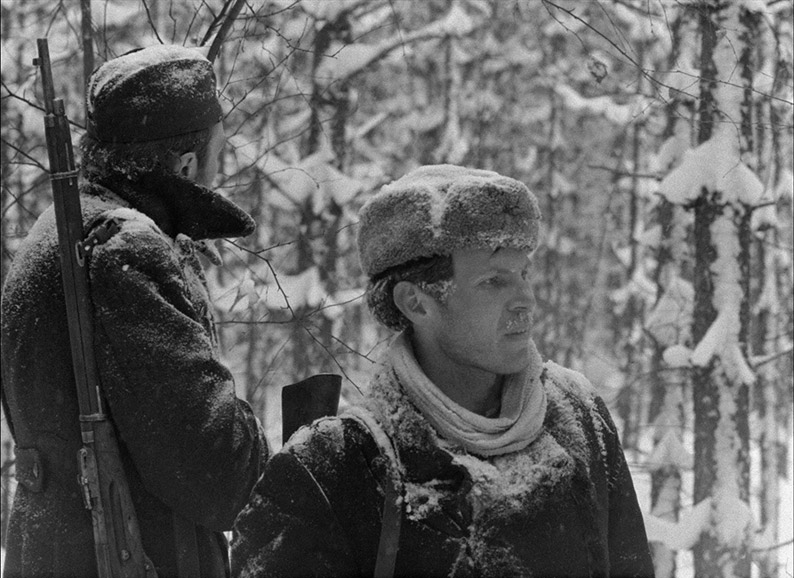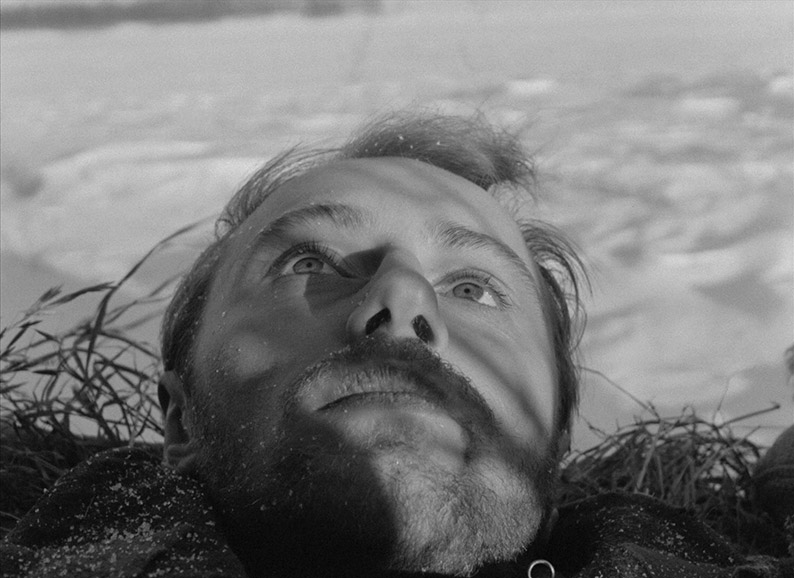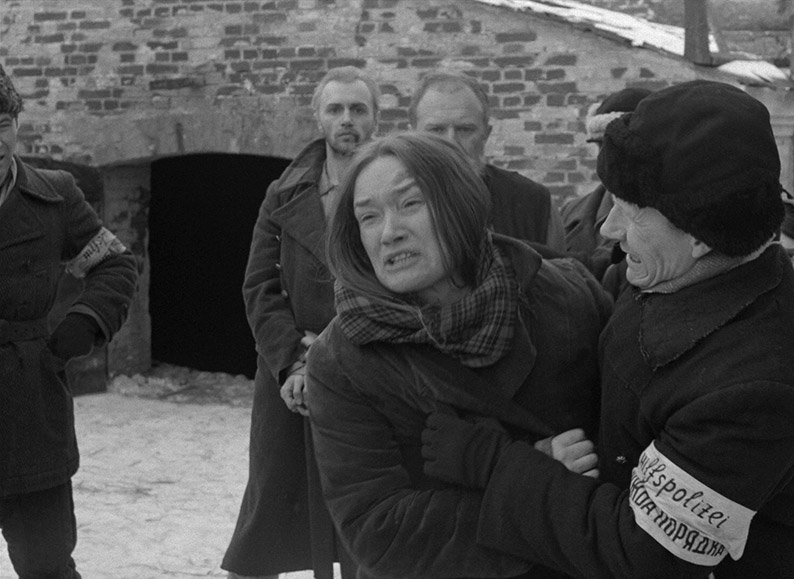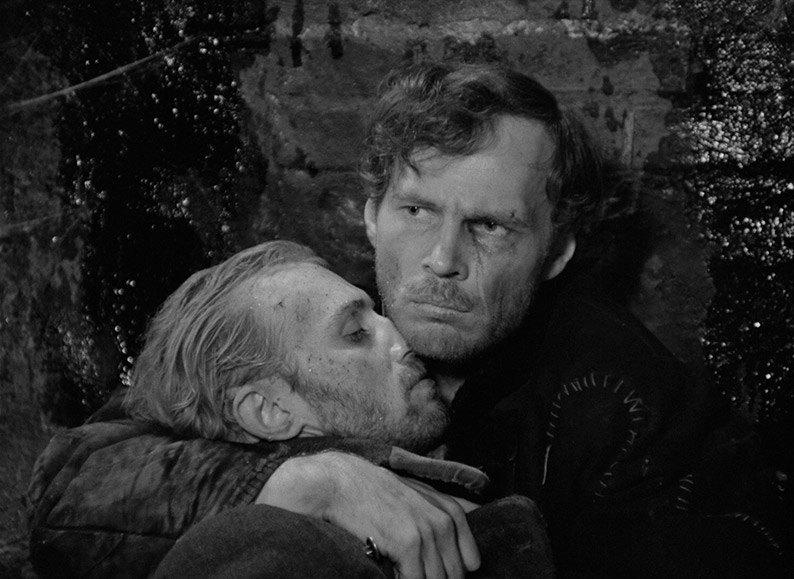|
My second viewing of The Ascent [Voskhozhdenie] confirmed to me that this film is, in my opinion, a masterpiece. The film examines personal behaviour and choices against the backdrop of World War Two in Belarus. It is based on the book “Sotnikov” by Vasil Bykau. The film was a passion project for the director and it took several years to get official approval to make the film.
In the opening section Shepitko establishes the setting and the circumstances – we are in the Belarus countryside during the Nazi occupation. This is war and the local Belarussians (a caravan of men, women and children) are being attacked by a Nazi unit. Shepitko uses this scene to establish the chaos that now reigns in this world and the suffering of those caught up in it. In addition, the physical environment is relentlessly hostile – it is bitterly cold, as low as minus 40 celsius during shooting - it is difficult for hope to survive in these conditions.
We learn a lot about the characters of Rybak and Sotnikov during this opening episode and that became apparent to me on a second viewing when I was aware that these are the main protagonists of the story. In this opening section Shepitko skilfully shoots the action with realism and camera movements that portray the panic and desperation of the situation.

As Rybak and Sotnikov are chosen by the caravan to go on a special mission the camera zooms away from the pair as they walk through a corridor in the trees. Shepitko adds ethereal music to the scene confirming that their journey is partly a practical mission of finding food but more importantly an inward journey into their souls. Rybak and Sotnikov undergo enormous change throughout the film and multiple viewings are needed to grasp this. I have no doubt that my views on the film will change as I gain more life experience. The questions that Shepitko examines are complex and profound. I felt that a few scenes were a bit heavy handed in their allegory however the sincerity, talent and skill on display trumped any reservations that I might have.
The acting is superb – it is claimed that Shepitko looked for an actor who resembled classical images of Jesus Christ to play Sotnikov – Boris Plotnikov gives an excellent performance. Vladimir Gostyukhin is terrific as Rybak. All secondary roles are played with searing authenticity. Shepitko’s casting decisions were perfect and she inspired all the actors to give their very best to the project. The character of Portnov enters the story just before the midway point in the film and he adds a layer of complexity to the story. He is Belarussian and has become a key ally of the Nazis helping them hunt down and subdue the Belarussians. Portnov is played by Tarkovsky favourite Anatoly Solonitsyn. I cannot praise his performance enough – I am haunted by what he conveys through his eyes. This man is deeply conflicted, uncertain, tormented and unstable. It is a performance that has to be seen. Interestingly Shepitko had to persuade Solonitsyn that the role was worthwhile.
The Christian themes in the film were prohibited under Soviet censorship and it was the personal endorsement of the film by Masherov, the leader of the Belarussian Communist party at the time, that is accredited for its release uncut. Masherov had lived through the war and his mother had been hanged by the Nazis – he was overwhelmed by the film and fought for its release.

Shepitko draws on biblical themes of the crucifixion, betrayal and personal salvation. The film is ambitious, expertly made and timeless in its warning on the dangers and consequences that follow on from our choices – dangers to the individual who must live with the consequences and dangers to society. Morality is the central issue for humans – it is the fabric that can lay a foundation for a harmonious society that reduces human suffering. A lack of morality leads to a fractured society and increases suffering. This film can inspire us all to do better and to make moral choices in our lives.
The film received a 4K restoration from MosFilm in 2018 and it looks very strong. The image is sharp and we get exquisite detail in the outdoor scenes. The black and white photography is beautiful. The print is free from scratches and blemishes and framed in its original aspect ratio of 1.37:1
The sound track is presented in a LPCM 1.0 Mono track and it sounds very clear throughout the film. The score by renowned Soviet composer Alfred Schnittke is sparse, dissonant and ominous adding to the atmosphere. There is only one scene where the score is lyrical and it stands out for its tenderness – this lyrical theme reappears at the end of the film in a pained and distorted version.
Select Scene Commentary by Daniel Bird (33:08)
This commentary is focussed on a few select scenes and discuss various aspects of the film-making. There is considerable detail on the literary source of the film. He also gives good information on the composer Alfred Schnittke.
Introduction by Anton Klimov (17:38)
Anton is the son of Larisa Shepitko and Elim Klimov. He is very articulate and gives a valuable personal insight into the making of this film and what it meant to his mother.

Lyudmila Polyakova Interview (22:18)
Polyakova singles out Solonitsyn’s performance and brings attention to the depth of expression in his eyes – something that struck me also. She is articulate and her reminiscences on the film are very valuable.
Short Film 'The Homeland of Electricity' 1967 (38:50)
This short film was commissioned by the authorities to mark the 50th anniversary of the Revolution. Three directors (Shepitko, Gabai and Smirnov) contributed works – the Shepitko and Smirnov films were deemed too pessimistic and were not seen for 20 years. The film is striking – the story is set in a drought stricken village where an engineer uses a motor to pump water and so irrigate the land. The film has a surreal quality to it – the alienated and modern soundtrack sits uneasily with the somewhat socialist narrative of the story which values work and intelligence over religion and traditional ways of living. Shepitko portrays the elderly villagers with compassion and interest. An interesting addition to Shepitko’s brief filmography.
Larisa (20:46)
A year after Shepitko’s death, her husband Elim Klimov made this touching tribute to her life and work. It poignantly uses The Ascent suite music from the film.
A Talk With Larisa (52:10)
Shepitko returned to the Berlin Film Festival in 1978 where this interview was conducted. It is a long interview that illustrates what remarkable qualities Larisa Shepitko had – she was intelligent, talented, had strong personal integrity, well spoken, beautiful and very hard working. She made a strong impression on me. Shepitko was clearly grateful for the support that local Belarussian people who appear in the film gave to the film-making process. They believed this was an important film to make. There are a few outtakes from this interview that appear in the documentary More Than Love.

'Islands' (39:55) and 'More Than Love' (39:03)
Two documentaries that focus on the life and work of Larisa and her marriage to Elim Klimov. They are well made with archival footage and contemporary interviews with family members as well as work colleagues. They provide tremendous insight into her personality and work ethic together with information and commentary on her four films. The influence of the renowned Soviet film-maker Dovzhenko is highlighted.
Booklet Essay by Fanny Howe
Good biographical information on Shepitko and the making of the film. It also explores some of the themes of the film.
This is a heavyweight Criterion release – the film has layers of depth that will reward repeat viewings. Although the subject matter is weighty the film is so expertly crafted and paced that it easy to watch. This was Shepitko’s fourth and last feature film – she died tragically in a car crash in 1979.The film won the 1977 Golden Bear at the Berlin Film Festival.
Shepitko searched for the truth in her films and for this she is seen to be the spiritual successor of her mentor Dovzhenko. With this film Shepitko showed that she is a major artist and belongs in the same conversations as her Soviet colleagues Tarkovsky and Kalatozov. Criterion have done justice to the film by providing us with a wealth of supplementary material which paints a portrait of this great artist.
Essential Cinema. Highly Recommended.
|